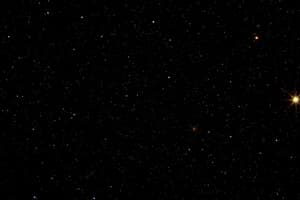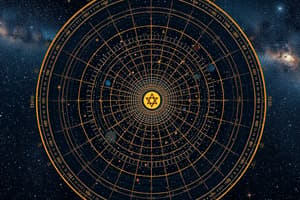Podcast
Questions and Answers
What does the Hertzsprung-Russell (H-R) diagram classify stars based on?
What does the Hertzsprung-Russell (H-R) diagram classify stars based on?
- Luminosity (correct)
- Size (correct)
- Surface temperature (correct)
- Color (correct)
What is the actual brightness of a star called?
What is the actual brightness of a star called?
Luminosity
What is absolute magnitude?
What is absolute magnitude?
The apparent magnitude of a star placed 32.6 light years from the sun
How bright does a star appear to an observer on Earth?
How bright does a star appear to an observer on Earth?
Describe a main sequence star.
Describe a main sequence star.
What is a supergiant star?
What is a supergiant star?
What defines a dwarf star?
What defines a dwarf star?
What are the characteristics of the sun according to the H-R diagram?
What are the characteristics of the sun according to the H-R diagram?
What is the relationship between star temperature and absolute magnitude?
What is the relationship between star temperature and absolute magnitude?
What would be the absolute magnitude and color of a main sequence star with a temperature?
What would be the absolute magnitude and color of a main sequence star with a temperature?
How does a star's color change as its temperature increases?
How does a star's color change as its temperature increases?
Why does a cool distant supergiant star have a high apparent magnitude?
Why does a cool distant supergiant star have a high apparent magnitude?
Why do nearby white dwarf stars have low absolute magnitudes?
Why do nearby white dwarf stars have low absolute magnitudes?
If Deneb and Rigel were at Alpha Centauri's distance, how would they appear?
If Deneb and Rigel were at Alpha Centauri's distance, how would they appear?
How much brighter is Rigel than the sun?
How much brighter is Rigel than the sun?
How can stars be classified using the Hertzsprung-Russell diagram?
How can stars be classified using the Hertzsprung-Russell diagram?
Flashcards are hidden until you start studying
Study Notes
Hertzsprung-Russell (H-R) Diagram
- Classifies stars based on luminosity, color, surface temperature, and size.
- Helps in understanding the relationship between different types of stars.
Luminosity
- Represents the true brightness of a star, independent of distance.
Absolute Magnitude
- Defined as the apparent magnitude of a star when placed 32.6 light-years from the sun, provides a standard measure to compare stars.
Apparent Magnitude
- Measures how bright a star appears to an observer on Earth, influenced by distance and intrinsic luminosity.
Main Sequence Stars
- Average-sized stars in the early stages of development.
- They occupy a central band in the H-R diagram.
Supergiant Stars
- Large, low-density stars that are hundreds of times more luminous than red giants.
Dwarf Stars
- Stars that have an absolute magnitude of +1 or less, indicating lower luminosity.
The Sun's Characteristics
- Absolute magnitude of 4.9.
- Surface temperature of approximately 5,800K.
- Yellow color and classified as spectral class G2.
Temperature and Absolute Magnitude Relationship
- Higher star temperatures correlate with greater luminosity, indicating that temperature influences a star's brightness.
Characteristics of a Main Sequence Star
- A main sequence star at certain temperatures can have an absolute magnitude of 13.2 and appear red in color.
Star Color and Temperature
- As a star's temperature increases, its color transitions to lighter tones, typically from red to blue.
Apparent Magnitude of Cool Distant Supergiants
- A cool distant supergiant star like Betelgeuse appears highly luminous due to its significant intrinsic brightness, despite its distance and lower temperature.
White Dwarfs and Absolute Magnitude
- White dwarf stars, despite having high temperatures, have low absolute magnitudes of +1 or less due to their lower luminosity.
Hypothetical Distances for Deneb and Rigel
- If Deneb and Rigel were at a distance comparable to Alpha Centauri, they would appear less luminous than typical supergiants due to differences in absolute magnitudes.
Rigel's Brightness Compared to the Sun
- Rigel is approximately 10,000 times brighter than the Sun, highlighting its immense luminosity.
Classifying Stars with the H-R Diagram
- Stars can be organized by spectral class based on their color, temperature, and size, allowing for a structured comparison within the H-R framework.
Studying That Suits You
Use AI to generate personalized quizzes and flashcards to suit your learning preferences.




